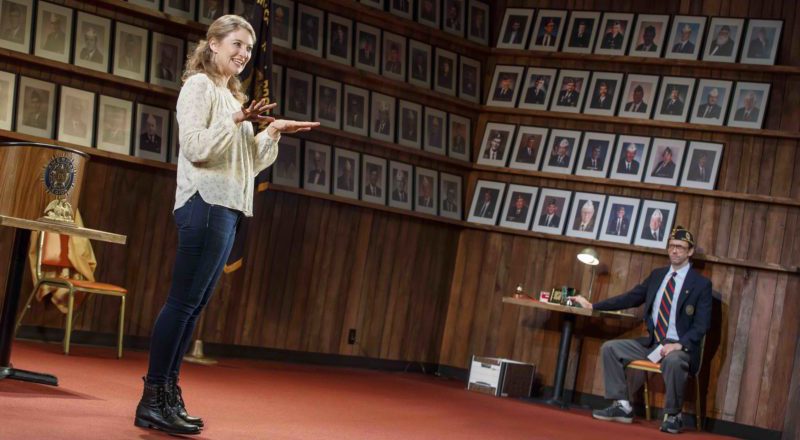INTERVIEW: Trying to decipher ‘What the Constitution Means to Me’
Photo: Heidi Schreck and Mike Iveson star in What the Constitution Means to Me at New York Theatre Workshop. Photo courtesy of Joan Marcus / Provided by Matt Ross Public Relations with permission.
New York Theatre Workshop has extended its hit fall production of Heidi Schreck’s What the Constitution Means to Me by five additional weeks. Performances of the play now run through Dec. 30 at Greenwich House Theater in New York City.
The show is a unique treatise on Schreck’s fascination and interpretation of the United States’ founding document. The playwright takes the stage and reimagines her teenage self, when she made money by giving speeches about the Constitution in community centers around the country. There are debates, history lessons, personal narratives and discussions, all centered on how the document has had an impact on the lives and bodies of women. The speeches are staged amidst a set made to look like a wood-paneled American Legion hall with photos of veterans gracing the back and side walls.
Playing the Legionnaire in the Oliver Butler-directed production is Mike Iveson. The actor is an alumnus of NYTW, having appeared in The Sound and the Fury, The Select/The Sun Also Rises and Fondly, Collette Richland, all shows produced by the Elevator Repair Service theater company. He has also appeared in plays at the Public, Kitchen, PS122 and Abrons Arts Center.
Iveson came to What the Constitution Means to Me after the actor who workshopped the play received a role in Broadway’s To Kill a Mockingbird. “So Heidi was looking around for people,” Iveson said in a recent phone interview. “We’ve been friends for a long time. We were in a show together. … She just asked me to do it, and I was like, ‘Yeah, I want to do that.'”
Iveson said that the experience of working on the show has been a rewarding one — and also a timely one. Schreck’s play covers many themes that are being debated and discussed amongst politicians in Washington, D.C., and society in general. However, the playwright’s focus is also evidence of what has been forgotten about by those people who often take to news channels and talk about the document.
“There’s so much great material that should be something that we’re all taught or something that we all refer to again after we learn it for two seconds in history class in sixth grade,” Iveson said. “One of the beautiful things about the show is Heidi is reminding us all of that kind of stuff. [For example], one of my favorite things is when Heidi mentions this thing in the show how the Native American cultures that were in America at the time of colonial contact, those cultures were matriarchal.”
These statements are profound in the play and offer renewed commentary on the contributions of women throughout history, and also the historic and continued discrimination and abuse of women. Schreck even delves into the history of her own family, detailing stories of her great-great-grandmother, a mail-order bride who died under mysterious circumstances.
The stories in the play have been experienced by some important political, cultural and societal figures. The entire cast was shocked and surprised to find that their constitutional discussions were being appreciated by sold-out crowds that included many luminaries. The Clintons, for example, stopped by to see what all the buzz was about.
“The Clintons came to see the show; that was the craziest thing,” Iveson said. “Nothing like that has ever happened to me; that was too crazy. We did this whole thing where I knew that they were coming, and then the costume guy at the workshop who is an old friend of mine, he was like, ‘Are you happy with what you’re wearing for all the photos with the Clintons?’ I was like, ‘Yeah.’ He’s like, ‘Do you want me to get you a blazer or something?’ ‘No, this is good. I like what I got.’ And then, of course, it didn’t matter because as soon as the show was over, the Clintons just stormed the stage, and nobody had time to change into any of their clothes that they had prepared for the photo shoot. We just did all the photos with the Clintons in our costumes. It was fantastic.”
The Clintons are not alone in their admiration for Schreck’s play and these thoughtful debates about women and the historic interpretation of the Constitution.
“I think Gloria Steinem told us this story when she came to the show,” Iveson said. “She was telling us after the show … how early Native Americans were meeting with the first settlers, and the settlers showed up to the meeting to discuss transfer of land or living together peacefully. But the Native Americans showed up as representing their people, and they were like, ‘Where are your women? You’ve come here to represent your people, and only the men are representing your people.’ Apparently they thought that was crazy, so it used to be throughout history within the country, before the settlers, it was more equitable between men and women running things.”
The debates and discussions continue through Dec. 30, and forever beyond that.
By John Soltes / Publisher / John@HollywoodSoapbox.com
What the Constitution Means to Me, written by and starring Heidi Schreck, continues through Dec. 30 at Greenwich House Theater in New York City. Click here for more information and tickets.

